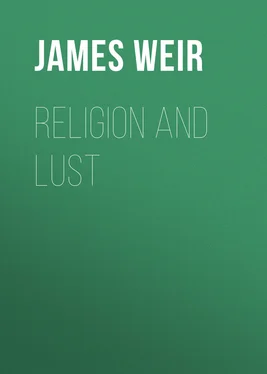James Weir - Religion and Lust
Здесь есть возможность читать онлайн «James Weir - Religion and Lust» — ознакомительный отрывок электронной книги совершенно бесплатно, а после прочтения отрывка купить полную версию. В некоторых случаях можно слушать аудио, скачать через торрент в формате fb2 и присутствует краткое содержание. Жанр: psy_sex_and_family, psy_sex_and_family, Эротика, Секс, Детская образовательная литература, Детская образовательная литература, на английском языке. Описание произведения, (предисловие) а так же отзывы посетителей доступны на портале библиотеки ЛибКат.
- Название:Religion and Lust
- Автор:
- Жанр:
- Год:неизвестен
- ISBN:нет данных
- Рейтинг книги:4 / 5. Голосов: 1
-
Избранное:Добавить в избранное
- Отзывы:
-
Ваша оценка:
- 80
- 1
- 2
- 3
- 4
- 5
Religion and Lust: краткое содержание, описание и аннотация
Предлагаем к чтению аннотацию, описание, краткое содержание или предисловие (зависит от того, что написал сам автор книги «Religion and Lust»). Если вы не нашли необходимую информацию о книге — напишите в комментариях, мы постараемся отыскать её.
Religion and Lust — читать онлайн ознакомительный отрывок
Ниже представлен текст книги, разбитый по страницам. Система сохранения места последней прочитанной страницы, позволяет с удобством читать онлайн бесплатно книгу «Religion and Lust», без необходимости каждый раз заново искать на чём Вы остановились. Поставьте закладку, и сможете в любой момент перейти на страницу, на которой закончили чтение.
Интервал:
Закладка:
We see from the examples here given, that religious feeling had its origin in the idea of propitiation; in fact, that it was born in fear, and by fear was it fostered. We see, furthermore, that man was not created with religious feeling as a psychical trait, but that he acquired it later on. We see, finally, that religious feeling is based, primarily and fundamentally, on one of the chief laws of nature—self-protection. The evolution and growth of Ethics demonstrate this beyond peradventure.
It is not at all probable that man in the beginning, just after his evolution from his ape-like ancestor, had, at first, any belief whatever in supernatural agencies. In his struggle for existence, all of his powers were directed toward the procurement of his food and the preservation of life; the pithecoid man was only a degree higher than the beasts in the scale of animal life. His psychic being, as yet, remained, as it were, in ovo , and a long period of time must have elapsed before he began to formulate and to recognize a system of theogony. After years of experience, during which the laws of heredity and progressive evolution played prominent parts, he took precedence over other animals, and his struggle for existence became easier. He then had time to study the wonderful and, to him, mysterious phenomena of nature. His limited knowledge could not explain the various natural operations by which he was surrounded, therefore he looked upon them as being mysterious and supernatural. His psychical being became active and inquiring, to satisfy which he created a system of gods which was founded on natural phenomena. At first, the gods of primitive man were, probably, few in number, and the chief god of all was the sun. Man early recognized the sun’s importance in the economy of nature; this beautiful star, rising in the east in the morning, marching through the heavens during the day, and sinking behind the western horizon in the evening, must have been, to the awakening soul of man, a source of endless conjecture and debate. What was more natural than his making the sun the greatest god in his system of theogony? Man recognized in him the source of all life, and, when he arrived at an age when he could use abstract ideation in formulating his religion, he deified the life-giving function as he noticed it in himself; he began to worship the generative principle. Solar worship and its direct descendant, phallic worship, at one time or another were the religions of almost every race on the face of the globe. Solar worship, owing to its material quality, has long since been abandoned by civilized man; but phallic worship, the first abstract religion evolved by man, has taken deeper root; its fundamental principles are still present, though they have their seat in our subliminal consciousness, and we are, therefore, not actively conscious of their existence. But before entering on the discussion of this last point, let us turn for a time to a study of phallic worship.
CHAPTER II.
PHALLIC WORSHIP
Phallic worship, in some form or other, has been practiced by almost every race under the sun. Indeed, among primitive peoples, those who do not practice this cult are so few in number that they have, practically, no weight whatever in a discussion of this subject. Moreover, those primitive peoples who do not worship the generative principle, either directly or indirectly, are without any religion whatsoever, and are the very lowest of all mankind in point of intelligence. I have only to cite the Tierra del Fuegians, the Bushmen, the Australians, and the Akka or Ticki-Ticki, the Pygmies of Central Africa, to prove the truthfulness of this assertion. There are other peoples who would serve as examples, but it would be a work of supererogation to enumerate them to even the casual reader.
D’Hancarville, in his magnificent work, has traced the progress of the worship of the generative principle over the entire world, while Knight, in his scholarly essay, 44 44 Knight: The Worship of Priapus .
has brought out its psychological truths in a manner which cannot be surpassed. It is not my purpose to enter into a detailed account of this cult; I propose rather to discuss its probable origin in the beginning, and to give a brief outline of its history, as it is to be observed among living peoples. I wish to show, also, its connection with certain religious ceremonies and festivals of Christian peoples, which had their origin, ab initio , in the worship of Priapus. And, before beginning the discussion of this subject, I beg to remind the reader that a priest of Priapus regarded his sistrum as being just as sacred as a Catholic priest now considers any vessel or robe used in the service of mass, and that the priests of Brahma look on the Lingam with as much reverence and awe as did the Levites on the Ark of the Covenant and the Holy of Holies. Phallic worship is a religion, the oldest abstract religion in existence. Fundamentally the Creator—the Life Giver—is the phallic worshiper’s god. Is he very far wrong in all that is absolutely essential? “Men think they know because they are sure they feel, and are firmly convinced because strongly agitated. Hence proceed that haste and violence with which devout persons of all religions condemn the rites and doctrines of others, and the furious zeal and bigotry with which they maintain their own, while, perhaps, if both were equally understood, both would be found to have the same meaning, and only to differ in the modes of conveying it.” 45 45 Knight: The Worship of Priapus , p. 14.
The Pueblo Indians of New Mexico are worshipers of the generative principle, and, like most religious sects, have evolved some very curious rites and ceremonies. The ancient temples of Venus or Aphrodite were filled with hetarae , who were necessary adjuncts for the proper performance of the mysteries of Priapus. These Indians, however, will not allow women to enter into their sacred ceremonies, but, on the contrary, emasculate men (by occasioning organic and functional degeneration of the sexual organs), who serve as hetaræ to the chiefs and shamans or priests. 46 46 The Aleutians, according to the testimony of unimpeachable witnesses, make their neophytes pass through like physical exercises in preparing them for their duties in celebrating Priapic Rites.
These androgynes are called mujerados , a term which aptly describes their sexual condition.
“In order to cultivate a mujerado, a very powerful man is chosen, and he is made to masturbate excessively and ride constantly. Gradually such irritable weakness of the genital organs is engendered that, in riding, great loss of semen is induced. This condition of irritability passes into paralytic impotence. Then the testicles and penis atrophy, the hair of the beard falls out, the voice loses its depth and compass, and physical strength and energy decrease. Inclinations and disposition become feminine. The mujerado loses his position in society as a man. He takes on feminine manners and customs, and associates with women; yet, for religious reasons, he is held in high honor.” 47 47 Krafft-Ebing: Psychopathia Sexualis , p. 201; see also Hammond: Impotence in the Male .
The phallic ceremonies of the Pueblos take place in the spring, when the life principle is exceedingly active throughout all nature.
In all probability the “botes” of the Montana Indians and the “burdachs” of the Washington tribes serve as masculine hetaræ to the chiefs and medicine men, though this has not been definitely determined. Dr. Holder described a typical “bote” of the Absaroke tribe in the New York Medical Journal, 1889. This androgyne, in many respects, resembled the mujerados of the Pueblo Indians, and probably served a like purpose in his tribe.
Читать дальшеИнтервал:
Закладка:
Похожие книги на «Religion and Lust»
Представляем Вашему вниманию похожие книги на «Religion and Lust» списком для выбора. Мы отобрали схожую по названию и смыслу литературу в надежде предоставить читателям больше вариантов отыскать новые, интересные, ещё непрочитанные произведения.
Обсуждение, отзывы о книге «Religion and Lust» и просто собственные мнения читателей. Оставьте ваши комментарии, напишите, что Вы думаете о произведении, его смысле или главных героях. Укажите что конкретно понравилось, а что нет, и почему Вы так считаете.












